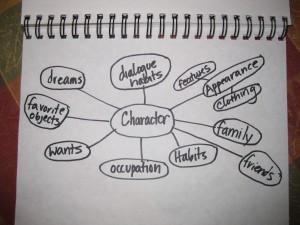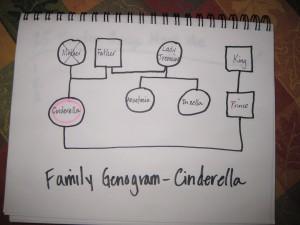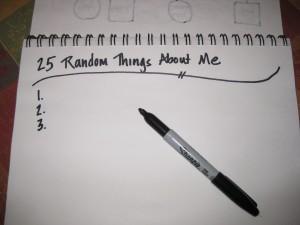Wednesday Writing Prompt: The Who by Rochelle Melander
Although I love a twisting plot, I tend to fall for books with well-drawn, intriguing characters. If the characters are rich, I find myself quoting them and relaying their experiences to my husband, almost as if they’re real people. I’ve even dreamt about a few of my favorite fictional characters.
In order to write characters who are round enough to cause our readers to dream about them, we need to know them well. Here are three tools for exploring your characters:
1. The Mind Map. I mind map everything, from article ideas to chapter content. The mind map can also be a good tool for developing your character. Here is an example of a mind map with some of the categories you will want to fill in for your characters.
2. The Genogram. The genogram is a chart that displays a person’s family relationships, much like a family tree. I use genograms to chart the relationships between characters in my books. A quick read of the Wikipedia article on genograms can help you understand and use the various symbols. For those of you who want a more thorough understanding, I like Genograms in Family Assessment by Monica McGoldrick. Here is the genogram of Cinerella’s family that I created for Write-A-Thon:
3. 25 Things! Remember a few years ago, when everyone was writing Facebook posts on 25 random things about me? I think that the 25 Things List would be a fun way to get into the head of one’s characters and start developing their voices. You might even save the list to use as a promotional blog post when your book is published.
There are more ideas for character development in my book, Write-A-Thon: Write Your Book in 26 Days (And Live to Tell About It).
Your turn: What tools will you use to explore your characters?
And a contest: enter to win your own copy of Write-A-Thon!












Tool I use for character development? I think of their entire history, and write little essays like “How I spent my summer vacation” on important events in their history.
Love this! Thanks, Casey.
My brain in the best tool for character development. When I started writing my first novel years ago, the characters used to tell me what they did, what their job was, how they came to be the way they are and much more. When I was younger and I heard writers say that the characters speak to them, I have to admit I didn’t know what they were talking about but having experienced my characters talking to me, I know exactly what they meant. For continuity purposes, I then make notes in a notebook of things I find out about the characters, so that other parts of the book make sense.
I love hearing this, Sandra! I have heard about other authors for whom that voice is the beginning of a novel. Thanks!
I have a character sheet that I try to fill out for each major and minor character which includes a lot specific things like age, gender, etc. but also includes things like job history, political opinions, and habits. I also like to make lists like the twenty-five list idea you gave above. Great post!
I love character sheets!
Characters are usually the first things that pop into my head. I write a lot of YA fiction and I’m a high school teacher, so I’m constantly jotting down the crazy things my students are saying. I start with a character and add dialogue. Before long, I know more about my characters based on what they say.
Teens are a source of such great material! How fun!
I use the tool of creating a facebook page for my characters. Who are their friends? Who would they reject? What pages would they like? As a result I get a clear picture of who they are by their FB page.
That’s really fun! Thanks!
I like to conduct interviews with the character. Not only does it help me get information about the character, it helps hear the character’s voice.
Good idea, Staci. Thanks!
Thanks for the character development tips. I will use these tips to create the characters I envision in my imagination.
You are welcome!
I have character sheets (appearance, likes/dislikes, family bio, quirks, fears etc) that I fill out for my main and secondary characters. I also “interview” my characters which really helps me get into their heads. I like the idea of using all the “things about me lists” that go around via email for character development – I am going to try that!
I like the interviewing. I think it is a good way to hear the character’s voice. I also love sheets: they help me keep the details straight!
Sometimes I find my characters taking on some of the personalities of friends or people I know. They are usually just a characteristic and not a full blown personality but it helps me to know the character or understand where they are coming from. I liked the random things you know about me approach to characters Thanks .
I do the same–of course it feels a bit like baking: a sprinkle of her, a cup of him, a few stirs and … like magic, a new character.